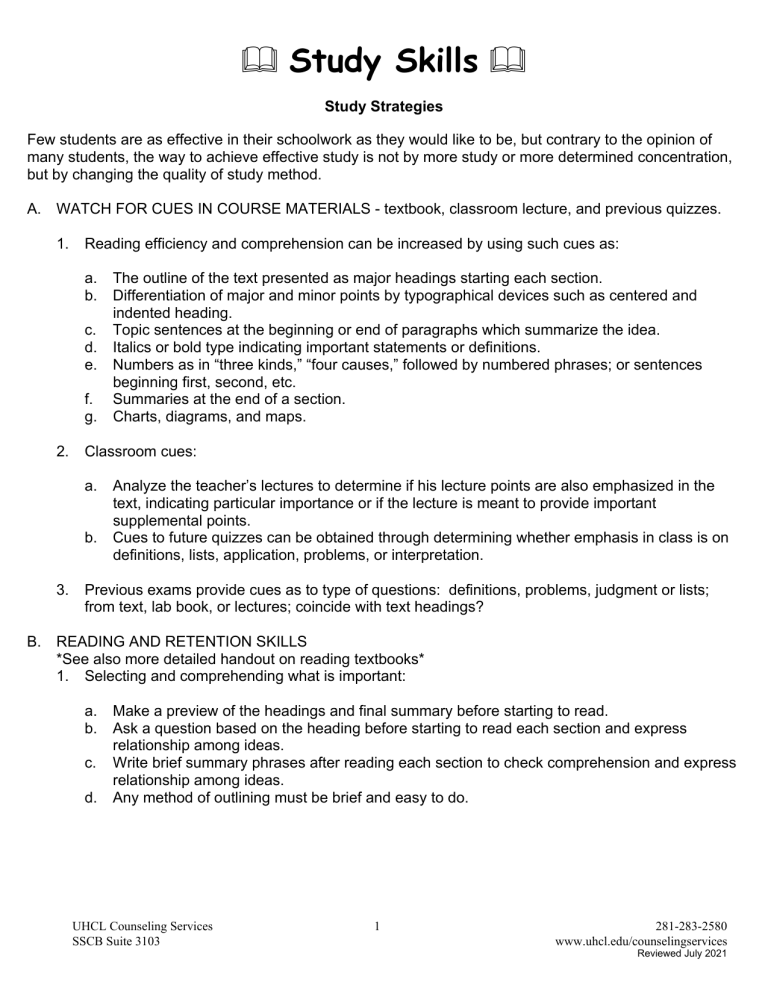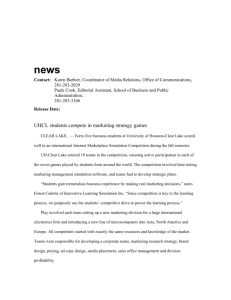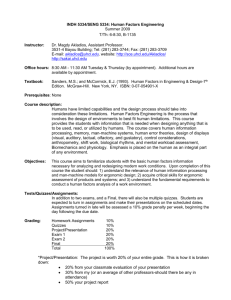
Study Skills Study Strategies Few students are as effective in their schoolwork as they would like to be, but contrary to the opinion of many students, the way to achieve effective study is not by more study or more determined concentration, but by changing the quality of study method. A. WATCH FOR CUES IN COURSE MATERIALS - textbook, classroom lecture, and previous quizzes. 1. Reading efficiency and comprehension can be increased by using such cues as: a. b. c. d. e. f. g. 2. Classroom cues: a. b. 3. B. The outline of the text presented as major headings starting each section. Differentiation of major and minor points by typographical devices such as centered and indented heading. Topic sentences at the beginning or end of paragraphs which summarize the idea. Italics or bold type indicating important statements or definitions. Numbers as in “three kinds,” “four causes,” followed by numbered phrases; or sentences beginning first, second, etc. Summaries at the end of a section. Charts, diagrams, and maps. Analyze the teacher’s lectures to determine if his lecture points are also emphasized in the text, indicating particular importance or if the lecture is meant to provide important supplemental points. Cues to future quizzes can be obtained through determining whether emphasis in class is on definitions, lists, application, problems, or interpretation. Previous exams provide cues as to type of questions: definitions, problems, judgment or lists; from text, lab book, or lectures; coincide with text headings? READING AND RETENTION SKILLS *See also more detailed handout on reading textbooks* 1. Selecting and comprehending what is important: a. b. c. d. Make a preview of the headings and final summary before starting to read. Ask a question based on the heading before starting to read each section and express relationship among ideas. Write brief summary phrases after reading each section to check comprehension and express relationship among ideas. Any method of outlining must be brief and easy to do. UHCL Counseling Services SSCB Suite 3103 1 281-283-2580 www.uhcl.edu/counselingservices Reviewed July 2021 2. Underlining: a. b. c. d. e. 3. Collateral Reading: a. b. c. d. e. 4. Survey headings and summaries quickly to get a notion of what major points will be covered. Turn each heading into a question as you start to read. Read the section to answer the question. Recite answer first by thinking what is important and then finding the main phrases which briefly state this point. Use a marking system that shows degree of importance of each point. Review your outline of underlinings and recite again to fix these ideas in your mind. Survey chapter headings and preface. Question why book was assigned. Read larger units. Recite material relevant to question answers. Review your notes when book is done. Ways to retard forgetting: a. b. c. d. e. f. Become interested in material read. Select major points. Intend to remember the major points. Distribute study time. Use self recitation such as working notes after each section. Later review all major points. EFFECTIVE SKILL IN EXAMINATIONS *See also more detailed handout on taking tests.* A. PREPARING FOR EXAMINATIONS: 1. Timing of reviews: a. b. c. d. 2. Methods of review: a. b. 3. Predict quiz questions and organize answers. For objective and essay examination, understand the main ideas and their relationships. Preparation for final examinations: a. b. B. Several review times, rather than one lengthy session should be scheduled. Review time should be scheduled separately from study time. A definite segment of the lesson should be assigned to each review time so the task looks possible of completion and does not lead to procrastination. The student should review for an hour or two the night before the examination. Review for a given course should be divided into blocks of material to have three or four spaced sessions; last session should be spent looking over notes of the whole course. Review selectively – the important points. TAKING EXAMINATIONS: UHCL Counseling Services SSCB Suite 3103 2 281-283-2580 www.uhcl.edu/counselingservices Reviewed July 2021 1. Essay a. b. 2. Think and write on one question at a time. Note the key word: i.e. list, compare: give only what is called for. Proofread your paper, write legibly and preferably in ink. Objective a. Work straight through the list of questions, skipping those you aren’t sure of temporarily. Return to them later. b. If there is no penalty for guessing, you are better off to guess than to omit an answer. c. True-False statements with two independent clauses in which one is true and one is false are marked false. Key words such as: no, never, every, all, entirely, etc. usually indicate that the statement is false. Multiple-choice questions can be best answered by a process of elimination. On matching questions where an answer may be used only once, cross each out as you use it, answering known ones first. It is better to fill in the best answer on completion questions than to leave it blank. On Application of Principles test, incorrect statements are worded to resemble common false arguments such as: d. e. f. g. 1) 2) 3) 4) 5) 6) 7) 8) reasoning by false analogy merely restating the conclusion reference to similar happening appeal to authority use of ridicule teleological reasons irrelevant reasons untrue statements C. MAKE USE OF RETURNED EXAMS 1. 2. Items missed require further study Analyze types of questions SKILLS IN ATTENTION AND CONCENTRATION *See also more detailed handout on concentration.* A. DEVELOP WORK-STUDY SKILLS - By evaluating your present time schedule and deciding whether it is adequate for your needs. If not, redistribute your time among the various activities. B. USE YOUR TIME EFFICIENTLY 1. Study an assignment just after a class if it was a lecture; study just before if it is to be a recitation UHCL Counseling Services SSCB Suite 3103 3 281-283-2580 www.uhcl.edu/counselingservices Reviewed July 2021 2. 3. 4. 5. 6. 7. or discussion. Take short relaxation breaks during long study periods between change of subjects. Study a subject everyday for a short while rather than having occasional long sessions. Use vacant hours between classes for study periods Schedule certain times for recreation and use it. Make the schedule a habit which is only changed for special events. Don’t worry about the other parts of the schedule while carrying out the current one. C. STUDY CONDITIONS 1. 2. 3. 4. Minimize distractions during study; study in a quiet, rather bare area where you can’t see pictures, people, flickering lights, etc. or hear music, talking or other loud noises. Physical surroundings should be the same every time. Maintain an active posture, dress, etc., so that you will not be reminded of sleep or fun activity. Have all materials on hand when you begin to study. Lighting conditions – one should not have too much contrast between light in the work area and that in the rest of the room. There should be no glare on the book and light should not shine in your eyes. Physiological Factors – You can’t study well after the time your body is conditioned to sleep, after heavy eating or coming into a warm room from the cold or heavy activity. Poor health can also affect concentration. MOTIVATION TO STUDY Rather than trying to ignore problems which are distracting, it is better to solve them. Such problems may deal with health, finances, social acceptance, worries about mental health, anxieties, strange behavior, etc. If they can’t be eliminated, they must at least be adjusted to by you. It may help to find courses in which you are more interested, but which are equally beneficial. Studying and fun can both fit the schedule, but try to emphasize intellectual competence if you want academic success. Don’t wait for someone to make you study, try to see how your studying relates to future work and goals. Make notes on your progress in overcoming specific problems. See a counselor at the Counseling Center if you feel stuck and could use some new perspectives. CLASSROOM SKILLS A. HANDLING LECTURES: Sit where you can hear the lecture and see the blackboard. Use organizational cues such as inflection, topic sentences, and summary statements to spot major points. Don’t try to copy everything. Organize your notes. You might try a tape recorder for rapid speakers. You can listen to the tapes on the road as well as at home. Be sure to add your notes from the tapes or transcribe the tapes. B. DISCUSSION AND CLASS RECITATION: 1. Prepare yourself on several topics which are likely to come up in class and volunteer to talk. Do the homework so you can participate. UHCL Counseling Services SSCB Suite 3103 4 281-283-2580 www.uhcl.edu/counselingservices Reviewed July 2021 2. 3. 4. 5. Don’t be afraid to give your opinion when asked. Suggest applications to practical solutions of what you are studying or ask for them. Start participating early in the school term. When something is not understood, ask questions. C. CLASS MANNERS: 1. 2. 3. 4. 5. Don’t cut classes. Be on time. Help carry your share of the lead in discussions. Get yourself interested and you will be less bored. Get assignments in on time. D. MAKE CONFERENCES WITH TEACHERS and keep appointments. Ask for help without complaints or accusations. Learn to be assertive. PREPARING REPORTS *See also more detailed handout on writing papers.* First study a map of your library and learn the locations of resources such as card catalogue, indexes, and general references. Second, analyze your previous papers to discover what is wrong with form, written expression, spelling, etc., then drill to correct these errors. Third, organize your paper: 1) Select a topic which is broad enough to provide plenty of material but can be limited. 2) Build your bibliography and keep notes on your reading from which the paper will be written later. 3) Keep an idea page and jot down angles to the topic or recent related events and articles you find. 4) Outline the paper in detail with phrases and cue words. 5) Write the paper by turning the outline into complete sentences and elaborating or clarifying as you go. 6) Correct and type or rewrite the paper legibly with a title page and place in a binder. UHCL Counseling Services SSCB Suite 3103 5 281-283-2580 www.uhcl.edu/counselingservices Reviewed July 2021


